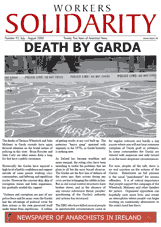Over 30 years of anarchist writing from Ireland listed under hundreds of topics
Book review: The rebel sell
An interesting but deeply flawed book which is worth reading for its powerful deconstruction of the claims of the counterculture to be revolutionary, despite its utter confusion on the significant differences between anarchism and countercultural ideas The Rebel Sell: How the Counter Culture Became Consumer Culture (Capstone Publishing)
by Joseph Heath and Andrew Potter
With a tagline on the inner dust cover that reveals the authors disappointment that “Counterculture has almost completely replaced socialism as the basis of radical political thought” I had expected to sympathise quite strongly with this book. The picture of the authors with “defy the state” graffiti behind them on the back dust cover also gave me a warm feeling inside so I picked it up on the spot. Given these initial signs I had assumed (mistakenly as it turns out) that the authors were at worst socialists of some kind, and at best quite sympathetic to anarchist ideas.
I was completely off the mark – the authors are in fact pretty firmly in the social democratic, liberal tradition, they claim to consider themselves part of the “left”, but I certainly came across nothing more radical than the socialism-lite of the average Labour voter. I did find myself nodding, chuckling through and thoroughly enjoying their attacks on the “counterculture” – I particularly enjoyed their attack on the pretensions of Adbusters to be revolutionary and “against the system” when they’re now flogging sneakers just like their supposed mortal enemy – Nike. Unfortunately, the authors seem to believe that “counterculture” and “anarchist” ideas are pretty much interchangeable.
One particular passage about Rousseau is worth quoting in its entirety since it will serve to show how the authors misunderstand anarchism to be a “rebellion against mass society” :
“He was opposed to the specifically hierarchical form that this order had taken on in his own society. It was the perversion of the natural order into class domination that angered him. In other words, despite the sweeping nature of his indictment, Rousseau’s critique was directed against a specific class enemy – the aristocracy. Furthermore, he regarded the general population – the masses – as a natural ally in the struggle. The social upheavals that his thought inspired – up to and including the French Revolution, were not anarchic uprisings against society at large. They were aimed quite specifically at the ruling classes.”
But anarchists like ourselves would argue that an uprising directed against the ruling classes is a perfect example of class struggle anarchism.
At the very end of the book, the “Spaceship Earth”chapter critiques the environmental movement, easy targets like Deep Ecology and “Buy Nothing Day” and finally concludes with their “practical fix” of encouraging emissions trading as a solution to our environmental problems. As Sharon Beder rightly observes in “Global Spin :The Corporate Assault on the Environment”, emissions trading merely involves selling the “right to pollute” to the highest bidder.
Overall, this is an interesting but deeply flawed book which is worth reading for it’s powerful deconstruction of the claims of the counterculture to be revolutionary, and despite its utter confusion on the significant differences between anarchism and countercultural ideas.
Lucien Ducasse
|
This article is from You can download the PDF file of WS92 |
 |

